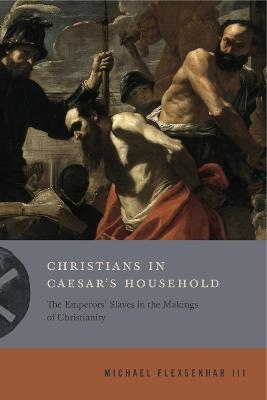
Christians in Caesar’s Household
The Emperors’ Slaves in the Makings of Christianity
Seiten
2019
Pennsylvania State University Press (Verlag)
978-0-271-08233-2 (ISBN)
Pennsylvania State University Press (Verlag)
978-0-271-08233-2 (ISBN)
Examines the role of the Roman emperors’ slaves in the rise of Christianity, and how imperial slaves were essential to early Christians’ self-conception as a distinct people in the Mediterranean.
In this volume, Michael Flexsenhar III advances the argument that imperial slaves and freedpersons in the Roman Empire were essential to early Christians’ self-conception as a distinct people in the Mediterranean and played a multifaceted role in the making of early Christianity.
Scholarship in early Christianity has for centuries viewed Roman emperors’ slaves and freedmen as responsible for ushering Christianity onto the world stage, traditionally using Paul’s allusion to “the saints from Caesar’s household” in Philippians 4:22 as a core literary lens. Merging textual and material evidence with diaspora and memory studies, Flexsenhar expands on this narrative to explore new and more nuanced representations of this group, showing how the long-accepted stories of Christian slaves and freepersons in Caesar’s household should not be taken at face value but should instead be understood within the context of Christian myth- and meaning-making. Flexsenhar analyzes textual and material evidence from the first to the sixth century, spanning Roman Asia, the Aegean rim, Gaul, and the coast of North Africa as well as the imperial capital itself. As a result, this book shows how stories of the emperor’s slaves were integral to key developments in the spread of Christianity, generating origin myths in Rome and establishing a shared history and geography there, differentiating and negotiating assimilation with other groups, and expressing commemorative language, ritual acts, and a material culture.
With its thoughtful critical readings of literary and material sources and its fresh analysis of the lived experiences of imperial slaves and freedpersons, Christians in Caesar’s Household is indispensable reading for scholars of early Christianity, the origins of religion, and the Roman Empire.
In this volume, Michael Flexsenhar III advances the argument that imperial slaves and freedpersons in the Roman Empire were essential to early Christians’ self-conception as a distinct people in the Mediterranean and played a multifaceted role in the making of early Christianity.
Scholarship in early Christianity has for centuries viewed Roman emperors’ slaves and freedmen as responsible for ushering Christianity onto the world stage, traditionally using Paul’s allusion to “the saints from Caesar’s household” in Philippians 4:22 as a core literary lens. Merging textual and material evidence with diaspora and memory studies, Flexsenhar expands on this narrative to explore new and more nuanced representations of this group, showing how the long-accepted stories of Christian slaves and freepersons in Caesar’s household should not be taken at face value but should instead be understood within the context of Christian myth- and meaning-making. Flexsenhar analyzes textual and material evidence from the first to the sixth century, spanning Roman Asia, the Aegean rim, Gaul, and the coast of North Africa as well as the imperial capital itself. As a result, this book shows how stories of the emperor’s slaves were integral to key developments in the spread of Christianity, generating origin myths in Rome and establishing a shared history and geography there, differentiating and negotiating assimilation with other groups, and expressing commemorative language, ritual acts, and a material culture.
With its thoughtful critical readings of literary and material sources and its fresh analysis of the lived experiences of imperial slaves and freedpersons, Christians in Caesar’s Household is indispensable reading for scholars of early Christianity, the origins of religion, and the Roman Empire.
Michael Flexsenhar III is Visiting Assistant Professor of Religious Studies at Rhodes College.
List of Illustrations
Acknowledgments
List of Abbreviations
Introduction
1 Paul, the Philippians, and Caesar’s Household (Phil 4:22)
2 Paul, Peter, and Nero’s Slaves: Martyrdoms and Apostolic Acts
3 Rome’s Imperial Household in Christian Polemic and Apologetic
4 Christian Piety and a Martyred Slave of Caesar
5 Material Evidence for a Christian Imperial Freedman
6 Christians and Imperial Personnel in Rome’s Catacombs
Conclusion: The Memory of Imperial Slavery in Early Christianity
Appendixes
Notes
Bibliography
Index
| Erscheinungsdatum | 23.04.2019 |
|---|---|
| Reihe/Serie | Inventing Christianity |
| Zusatzinfo | 2 Maps; 17 Halftones, black and white |
| Verlagsort | University Park |
| Sprache | englisch |
| Maße | 152 x 229 mm |
| Gewicht | 499 g |
| Themenwelt | Sachbuch/Ratgeber ► Geschichte / Politik ► Vor- und Frühgeschichte / Antike |
| Geisteswissenschaften ► Archäologie | |
| Geschichte ► Teilgebiete der Geschichte ► Religionsgeschichte | |
| Religion / Theologie ► Christentum ► Kirchengeschichte | |
| ISBN-10 | 0-271-08233-X / 027108233X |
| ISBN-13 | 978-0-271-08233-2 / 9780271082332 |
| Zustand | Neuware |
| Haben Sie eine Frage zum Produkt? |
Mehr entdecken
aus dem Bereich
aus dem Bereich
Herkunft, Blüte, Weg nach Osten
Buch | Hardcover (2024)
C.H.Beck (Verlag)
CHF 55,90
Von den Anfängen bis zur Gegenwart
Buch | Hardcover (2022)
C.H.Beck (Verlag)
CHF 47,60
warum die Religionen erst im Mittelalter entstanden sind
Buch | Hardcover (2024)
C.H.Beck (Verlag)
CHF 53,20


